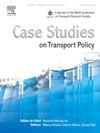Towards vehicle miles traveled reduction: Impact of mileage-based user fee on travel mode choices
IF 2.4
Q3 TRANSPORTATION
引用次数: 0
Abstract
Mileage-based user fee (MBUF) could be a potential solution to reduce the gap in current transportation funding. Though previous studies comprehensively discussed the impact of implementing MBUF on equity, privacy, and emissions, little attention has been given to the potential change in travelers’ mode choice behavior. This paper presents a framework to understand individuals’ mode choice behavior, considering the impact of MBUF. The empirical data for this paper is obtained through “Survey to Understand the Impact of MBUF on Travelers Choice (SUMTC)” which took place in April, 2024, in the North Carolina State. This web-based survey has two components: revealed preference (RP) and stated preference (SP), where the SP survey is designed to capture the influence of MBUF through hypothetical scenarios. Furthermore, this paper uses descriptive statistics and joint RP-SP discrete choice models to understand individuals’ mode preferences and the impact of MBUF on them for different trip purposes. The findings from the estimated models indicate that individuals are less likely to prefer motorized modes with the increased rate of MBUF. Full-time workers show more sensitivity towards MBUF for work trips, whereas college students are more sensitive to MBUF for recreational trips. Older adults show less sensitivity to MBUF than younger individuals. Older adults are more sensitive to MBUF for work trips, and young individuals are more sensitive to MBUF for work and grocery/shopping trips. The results reveal that increased fuel cost, parking/toll/admin cost, bus fare, and delays reduce the attractiveness of drive alone, carpool, and transit.
减少车辆行驶里程:里程收费对出行方式选择的影响
基于里程的用户收费(MBUF)可能是一个潜在的解决方案,以减少目前的交通资金缺口。虽然以往的研究全面讨论了实施MBUF对公平、隐私和排放的影响,但很少关注旅行者模式选择行为的潜在变化。考虑到MBUF的影响,提出了一个理解个体模式选择行为的框架。本文的实证数据是通过2024年4月在北卡罗来纳州进行的“了解MBUF对旅行者选择影响的调查(SUMTC)”获得的。这项基于网络的调查有两个组成部分:显示偏好(RP)和陈述偏好(SP),其中SP调查旨在通过假设情景捕捉MBUF的影响。此外,本文采用描述性统计和联合RP-SP离散选择模型来了解不同出行目的下个体的出行方式偏好以及MBUF对其的影响。估计模型的结果表明,随着MBUF率的增加,个体不太可能喜欢机动模式。全职工作者对公务旅行的MBUF更敏感,而大学生对休闲旅行的MBUF更敏感。老年人对MBUF的敏感性低于年轻人。老年人对工作旅行中的MBUF更敏感,而年轻人对工作和购物旅行中的MBUF更敏感。结果显示,燃油成本、停车/通行费/管理成本、公交票价和延误的增加降低了单独驾车、拼车和公交的吸引力。
本文章由计算机程序翻译,如有差异,请以英文原文为准。
求助全文
约1分钟内获得全文
求助全文

 求助内容:
求助内容: 应助结果提醒方式:
应助结果提醒方式:


